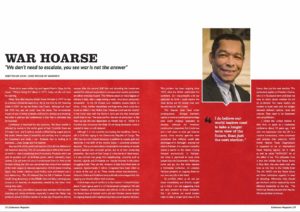
“War Hoarse,” written by Lord John Taylor of Warwick.
“We don’t need to escalate; you see war is not the answer”.
When Tony Blair became British Prime Minister in 1997 he had no previous ministerial experience. Yet by the time he left Downing Street in 2007, he had led Britain into 5 wars. Although we “won” the 2003 Iraq war, we could lose the peace. The humanitarian impact of war, in terms of deaths and injury is obvious and shocking. But what is perhaps less understood, is that War is ultimately bad for business.
Confidence is important for any economy. The Stock market is affected by events in the world, good or bad. Currently there are 10 major wars and 8 serious armed conflicts being waged around the world. Where there is instability and warfare, that is not good for investment and trade. I can illustrate that by looking at 3 examples……. Iraq, Congo and the Kashmir.
Iraq has 65% of the world’s oil reserves. Oil is still the lifeblood of the American economy. The US consumes about 30% of the world’s oil and it is vital to sustaining the UK economy. Products which we take for granted, such as fertilisers, plastic, petrol, cosmetics, many clothes, CDs and even ink are all manufactured from oil. Prior to the invasion of Iraq, the USA was concerned that none of the members of the Arab League (a regional organisation of Arab states including Egypt, Iraq, Jordan, Lebanon, Saudi Arabia, Syria and Yemen) was a true democracy. The US believed that the fall of Saddam Hussain would bring democracy to the Middle East and deny radical groups access to oil reserves, so desperately needed by the West. How wrong they were.
Since the war, new militant groups have emerged. ISIS has been attacking and taking territories, especially in areas like Falluja. Iraq produces about 3.3million barrels of oil per day. Production did not recover after the second Gulf War and attracting the investment needed for wells and exploration is not easy when bombs and bullets are still an everyday hazard. The militants attack on Iraq’s biggest oil refinery in Baiji, after a siege lasting a week, shut down production temporarily. In the Oil Market such instability creates higher oil prices. If Iraq further destabilises and fragments, there could be a knock on effect in the Middle East. Dispersal could see the Kurdish in the North align with the Kurds in Syria and the Shia dominated South look to Iran. The more conflict, the less oil production. In the West we are still very dependent on Middle East oil. Whilst it is true that new oil sources like Shale Oil are being developed, more is needed to keep up with demand.
Although it is not currently dominating the headlines, there is still a Civil War raging in the Democratic Republic of Congo. The DRC has very rich mineral resources. In addition to copper, gold and diamonds it has 80% of the world’s Coltan (columbite-tantalum) deposits. This is a mineral which is essential for the making of mobile phones, laptops and computer games, due to its heat conducting properties. But much of East Congo is in the hands of rebel troops. It is also claimed that gangs from neighboring countries such as Rwanda, Uganda and Zimbabwe are heavily involved in the coltan smuggling trade. They sell the minerals to help fund their store of weapons. Approximately 3 million Congolese have been killed as a result of the war, so far. Three mobile phone manufacturers…. Motorola, Nokia and Vodafone have publically acknowledged that this ongoing war directly affects their business.
A third major area of conflict is in the Kashmir. I visited Pakistan about 7 years ago as part of a UK Parliamentary delegation. We met senior Pakistani parliamentarians and officials. It fell to me to raise the thorny issue of Kashmir and to ask why Pakistan cannot resolve its ongoing dispute with neighboring India concerning that territory. This problem has been ongoing since 1947, after the British subdivided the continent. So I was probably a bit too optimistic to think I could resolve the issue during our 40-minute chat over tea and biscuits. Still, I tried.
This dispute does have wider consequences. Srinagar, Kashmir’s capital, is home to a software technology park which employs engineers to develop software for American construction companies. But it took two and a half years to even get internet access, since security agencies were concerned that militants would take advantage of it. Although I enjoyed my time in Pakistan, this constant instability seems a barrier to the nation moving forward economically. In Pakistan, the Army is perceived to have more power than the Government. Politicians come and go, but the Army remains a formidable institution. An unstable Pakistan presents an ongoing threat to our own security in the West.
To view “War Hoarse,” in Endeavour Magzine, please click here.
